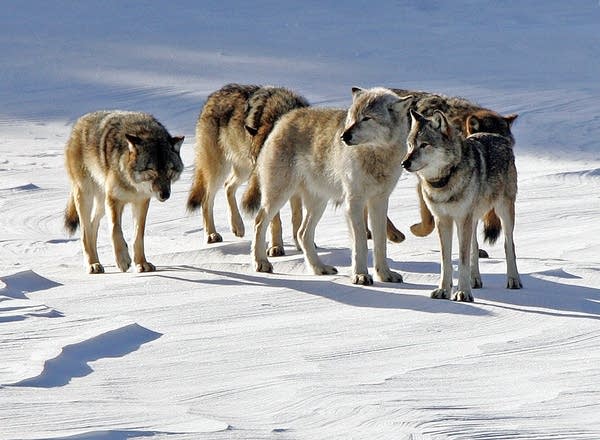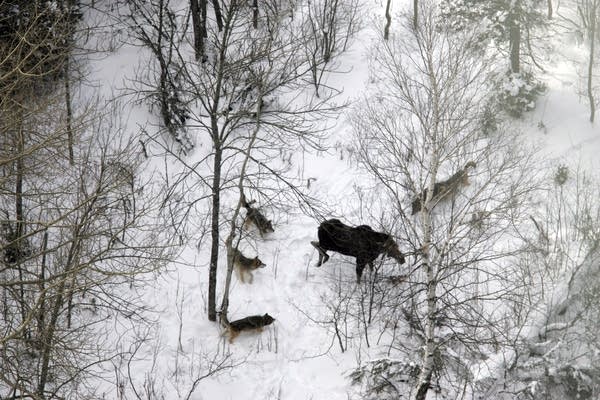Isle Royale wolf panel finds no clear path at hearing

Go Deeper.
Create an account or log in to save stories.
Like this?
Thanks for liking this story! We have added it to a list of your favorite stories.
Managers of Isle Royale National Park are in Minnesota this week to hear public opinion on what, if anything, should be done to help stabilize the island's declining wolf population.
Just eight adults and possibly a few pups remain in the protected wilderness area. That's down from a peak of 50 in 1980, and the animals are showing signs of inbreeding.
Researchers Rolf Peterson and John Vucetich, who run the Lake Superior island's 55-year old wolf and moose study, say wolves are key to the ecosystem and must be saved to keep the moose population in check. Others, including U.S. Geological Survey wolf expert Dave Mech, say scientists can learn a lot by just watching and waiting and not intervening.
They all heard from about two dozen members of the public in a question-and-answer session Tuesday in St. Paul. A similar session is planned for today in Duluth. They also heard from Phyllis Green, the park superintendent, who has yet to offer an opinion one way or another.
Turn Up Your Support
MPR News helps you turn down the noise and build shared understanding. Turn up your support for this public resource and keep trusted journalism accessible to all.
"As we explore the options the researchers have thrown out there, there are consequences that vary by those options, and we really need to understand them before we promote one path over another," Green said.
Current National Park Service policy is to not intervene in ecosystems. But as climate change affects other parks, Green says the decision on whether to help the Isle Royale wolves is likely to set a nationwide precedent.
While wolf management on the mainland usually brings out strong opinions, frequent visitors to the island understand that Green and other park managers have a tough decision.

"I'm less qualified to have an opinion than before I came to the meeting," said Karl Kirkman, of Rochester, who's seen wolves while camping at Isle Royale -- something he's done often since he was a kid. "Emotionally I'd like them to be there, but I don't know if that's the right answer."
Park managers are choosing among three options. They can let nature run its course and do nothing. They can let nature run its course and then introduce new wolves if the existing ones die off. Or they can try something called genetic rescue-- freshening up the gene pool by bringing in new wolves to join the others.
Joan McKearnan of St. Paul, who teaches biology at Anoka-Ramsey Community College, says Isle Royale is a case study on how humans interact with nature. But McKearnan says she too can't quite muster an opinion on the fate of the park's wolves.
"I can see doing genetic rescue if the idea is to keep the wolves on the island. But I also see the case for letting nature take its course. Maybe the wolves might even survive. They may surprise us you never know. And if that's the case, then let them evolve that way," McKearnan said.
Mike Meetz said he drove three hours from central Iowa to hear about the wolf proposals. He's a longtime visitor and volunteer at Isle Royale and says park service officials need to keep some basic questions in mind as they make their decision.
"What do we want to manage for? What time period? What kind of ecology? How will the environment be affected by wolves if they're not there to take care of the moose herd?" he wanted to know. "If they decide to forego replacing the wolves, how's that going to affect the moose, and what are they going to do about the moose population?"
Park Superintendent Green does not have a firm timeline to decide whether to intervene to stabilize the wolf population. But she says a decision must be made before nature eliminates one of the options -- genetic rescue of the existing population.
She also says everyone involved in the decision must ask an even more basic question: From what are we protecting the wolves, and for whom?
Dear reader,
Political debates with family or friends can get heated. But what if there was a way to handle them better?
You can learn how to have civil political conversations with our new e-book!
Download our free e-book, Talking Sense: Have Hard Political Conversations, Better, and learn how to talk without the tension.




